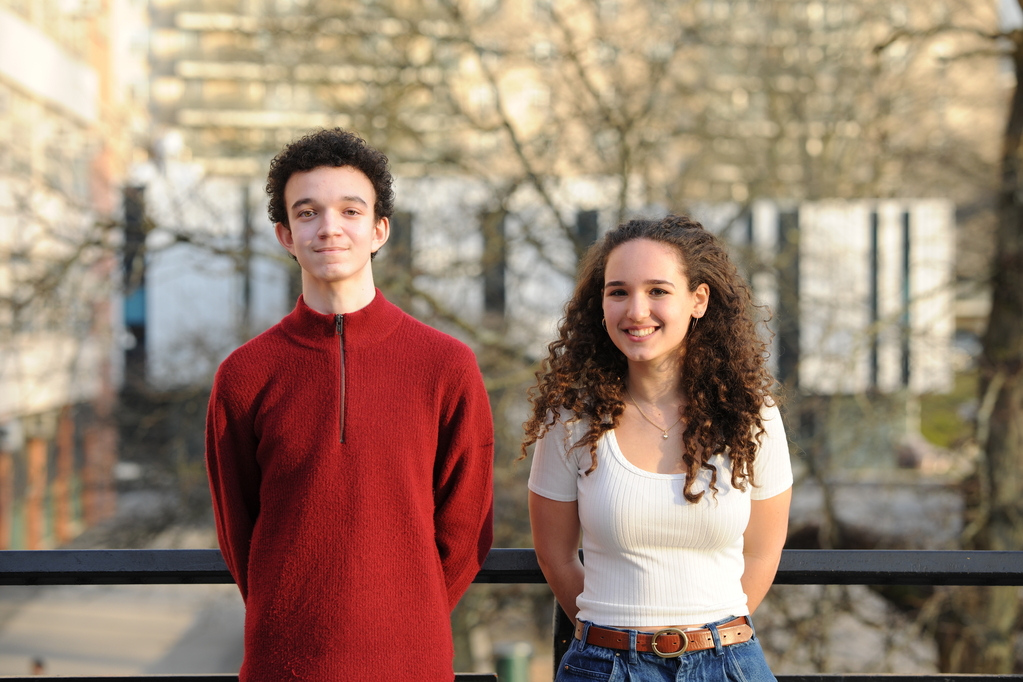On Thursday, February 8th, 2024, fifteen Bronx Science students gathered to compete for the chance to participate in the English Speaking Union National Shakespeare Competition. More than 360,000 students across the United States have participated in the annual competition since its creation in 1983. The winner of the national level of the competition receives the opportunity to attend the prestigious British American Drama Academy Mid-Summer Conservatory Program. But before students reach the national level competition, they must advance through the school and community phases of the competition.
The first step in competing in the Bronx Science Shakespeare Competition is to pick a sonnet and monologue to perform in front of the three judges, Bronx Science English teachers and Shakespeare aficionados Mr. Thorp, Dr. Montgomery, and Mr. McConnell. Nava Litt ’25, the three time winner of the Bronx Science Shakespeare competition, purposely chose a monologue and sonnet of differing styles to display her acting range. Her monologue from Titus Andronicus, (4.4.81, 84-96, 98-102) a Shakespearean tragedy about revenge, has a vindictive tone and utilizes manipulative language, while Sonnet 44, the sonnet that she performed, describes innocence and kindness. Another competitor, Anna Koontz ’25, chose her favorite monologue from her favorite Shakespeare play, Macbeth, which tells a story of strife and power struggles. Koontz said, “I love Macbeth’s “Tomorrow, and Tomorrow, and Tomorrow” soliloquy in particular because of its beautiful imagery and the shift that it indicates in Macbeth’s character development.”

Some students like Koontz love the Shakespeare Competition because it affords them an opportunity to analyze Shakespeare outside of the classroom. Alexandria Liu ’27 chose to perform Sonnet 116 because she enjoys exploring the concepts the poem illustrates. Liu’s sonnet explores the idea of true love and how it brightens and fades. She said, “A lot of people try to frame love as “Once you find ‘the one’, it’s all easy from there,” but this sonnet is really saying that it’s not. Love, true love, is enduring, and that’s why I like that sonnet so much.” Liliana Mejia ’27 similarly enjoyed exploring the feelings of love in her monologue (1.3.201-204, 206-214, 217-225) from All’s Well That Ends Well, a Shakespearean comedy about love. Mejia related Helena’s romantic struggles to ones she notices in modern media. She described how the overwhelming emotions that Helena wrestled with helped to fuel her acting and have fun with the character.
Other students enjoy the Shakespeare competition because they love performing. For Koontz, acting is a “freeing” experience. She said, “When you’re acting, you’re not yourself. Everything that you say and do are the words and actions of the character that you’re playing. I don’t have to be shy like I normally would be because the character that I’m playing is instead assertive, or angry, or joyful, or insane, or whatever it may be.” As she has grown older, Koontz has furthered her love of plays and acting through reading Shakespeare in classes and attending productions with her family. Evan Norat ’26, runner-up in this year’s competition, also loves performing. He said, “I cherish the ability to freely express myself while acting. While doing so, I feel empowered and special.”

Sadly, stage fright is a challenge for students participating in the Shakespeare Competition. The University of Florida reports that 72-75% of people experience some form of stage fright. Litt experiences stage fright, which she believes stems from the emotional nature of performing. She said, “Acting requires a level of emotional intimacy and vulnerability between a performer and the audience, and that takes a lot of bravery.” Nevertheless, Litt loves performing and enjoys participating in the Shakespeare Competition every year. Mejia has performed in many musicals outside of school, but still experiences stage fright occasionally. She said, “No matter how much memorizing and rehearsing you do, nothing can really prepare you for reciting your monologue and sonnet in such an intimate, yet exposing environment.”
Along with rehearsing their pieces, many competitors choreograph their performances. Litt carefully plans every movement in her monologue and sonnet, and has been praised year after year for her impressive choreography. Litt explained, “Before I perform, I write out my lines and annotate all of the movements that I intend to do.”
Norat’s monologue is from Henry V, a play about the transfer of divine power in fifteenth century France. He said, “For Henry V, I used rigid, regal movements to express his royalty and authority. On the other hand, I used elegant, graceful motions for my sonnet to better express the central idea that life always carries on.”

The Shakespeare Competition is not where the out of classroom Shakespeare exploration stops however, as this year Bronx Science student Ngozi Ihesiaba ’26 placed third in the ESU’s first ever “I AM Shakespeare” Sonnet Competition. Ihesiaba’s sonnet “My Crutch” is reprinted in full here:
Slow your walk, I’m not far behind you.
Your light is the spark that will set my soul
afire. For you, in your affects, are true.
It seems I do nothing else but extol
But above all, my affection is pure.
Please, I do not wish to attract your ire
There is nobody else to be my cure.
You warm my life, in my soul kindle fire.
I met my match in matters of the heart.
Please hear my song, desperately sincere.
None but you could draw out this work of art.
Indulge me a little while you are here.
But if you will offer me no closure
Farewell, I will be the sole composer.
Shakespeare education could not be more important at Bronx Science. Students and teachers alike love bringing Shakespeare’s work to life in classes. Kootz said, “Watching performances can be a way to make Shakespeare more relatable because they can feature a diverse cast or put the play in a modern setting. For example, I watched one production of Comedy of Errors where a deaf actor signed his lines while an interpreter spoke them aloud, and I also heard of a different bilingual production of the same play with Latin music and dialogue in both Spanish and English.”
Liu appreciates how Shakespeare’s works have inspired the best of every genre. Current adaptations of Shakespeare’s plays influenced some of Gen Z’s favorite movies such as Ten Things I Hate About You, She’s The Man, and West Side Story. Liu said, “Shakespeare’s plays have just the right amount of drama and comedy that’s understandable but also has the ability to be analyzed from so many perspectives. The love stories hold just the right amount of weight, the tragedies have immense feeling, the comedies the right amount of humor to be comprehensible and also funny.”
Shakespeare’s work has endured for the last 400 plus years because his plays and sonnets can be applied to every reader’s experiences. Koontz said, “Shakespeare never gets old because each time a play is performed, it’s with a different interpretation. Even though it’s the same words, different actors may emphasize one thing over another or have a unique idea behind the character. There are also infinite variations in the blocking, costumes, and setting that can present the same story in a new light.” At Bronx Science, students can find Shakespeare in their classroom curriculums and extra curricular activities.

Litt competed in the English Speaking Union’s Semi-Final Competition in which she competing against other winners from other high schools around New York City, with professionals in the world of theater as the judges. Unfortunately, she did not advance to the finals competition held at the Morgan Library. However, Litt looks forward to furthering her love for Shakespeare and competing again next year. Litt said, “I love participating in the Shakespeare Competition, and I hope many others continue to participate too!”
Anna Koontz ’25 said, “Shakespeare never gets old because each time a play is performed, it’s with a different interpretation. Even though it’s the same words, different actors may emphasize one thing over another or have a unique idea behind the character.”

